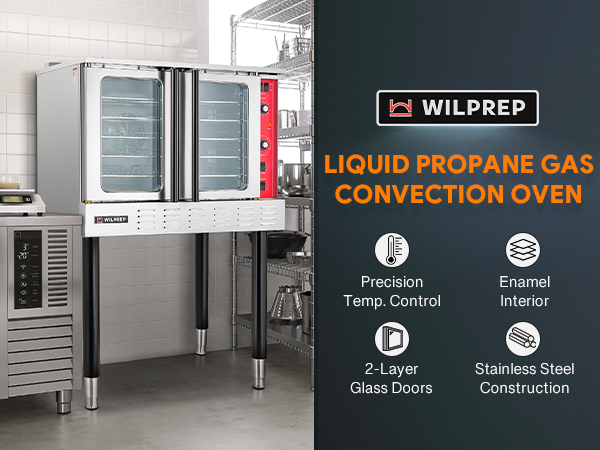
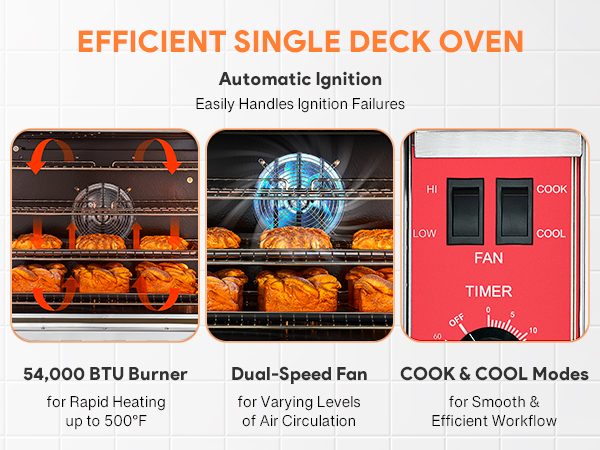
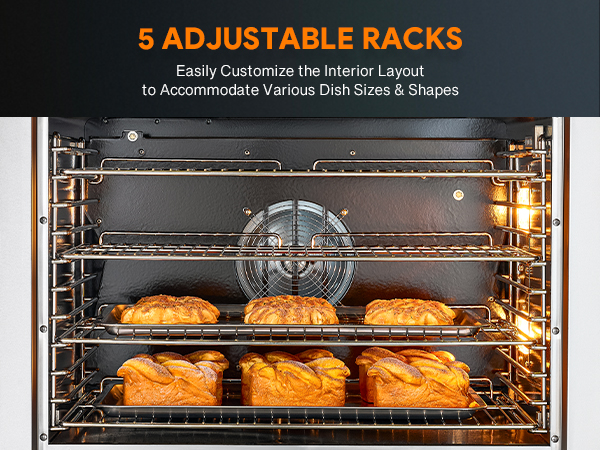
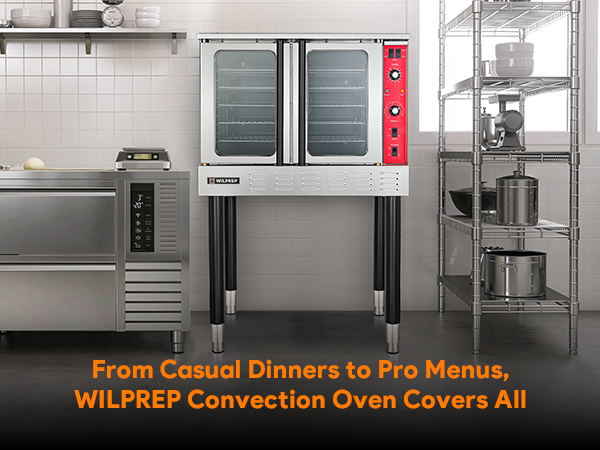
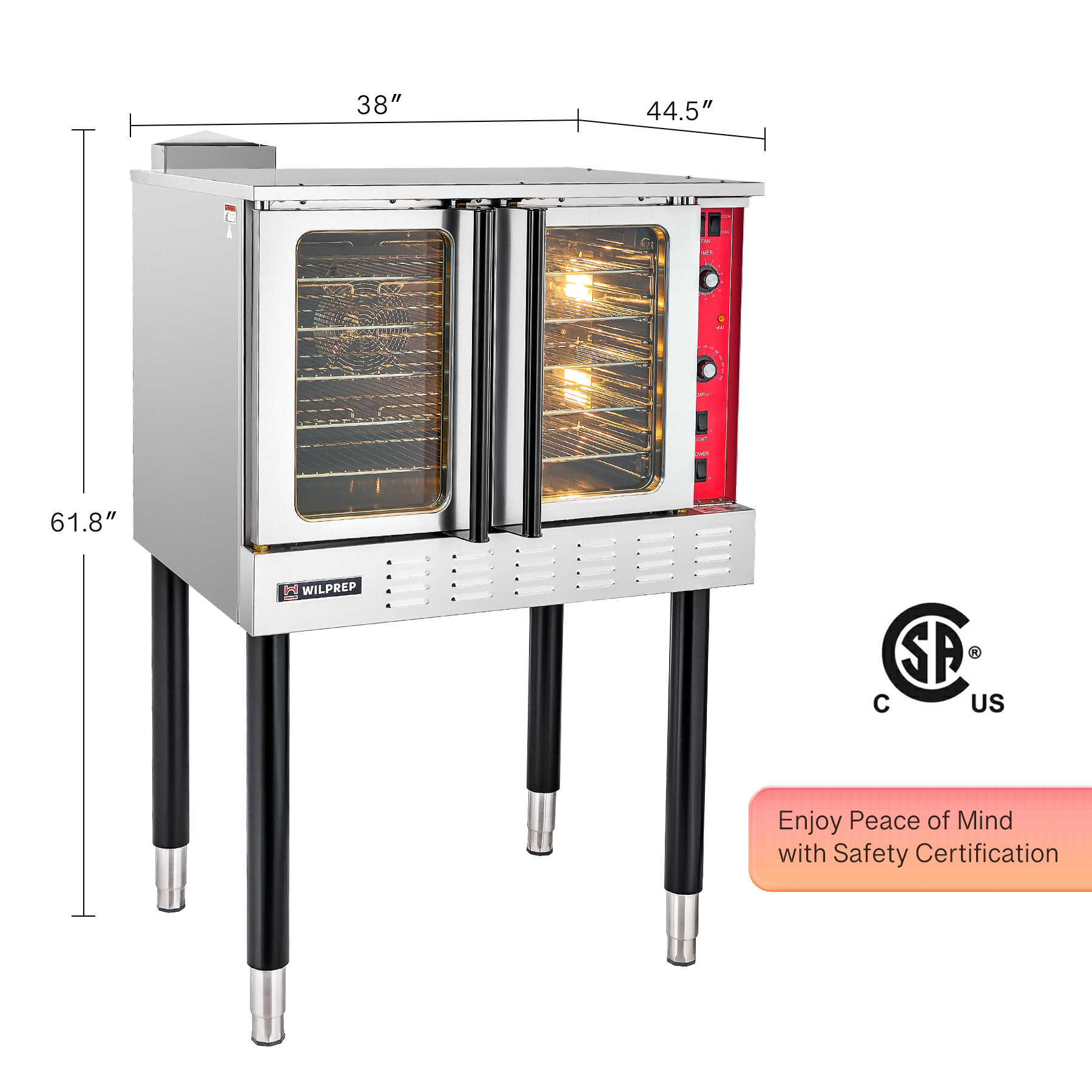
Specifications
Main Material: Stainless Steel
Gas Type: Liquid Propane Gas
Voltage: 120V
Power: 1000W
Number of Burners: 3
Single Burner Capacity: 18,000 BTU
Total Burner Capacity: 54,000 BTU
Gas Consumption: 2.8 lb. (1.3 kg)
Temperature Range: 150-500°F (66-260 °C)
Number of Racks: 5
Number of Rack Brackets: 11
Rack Bracket Spacing: 1.7 in. (42 mm)
Fan Power: 1/2 hp
Fan Speeds: 1725/1140 rpm
Timer Range: 0-60 min.
Chamber Dimensions: 29.1 x 21.5 x 19.6 in. (73.8x54.6x49.8 cm)
Overall Dimensions: 38 x 44.5 x 61.8 in. (96.5x113x157 cm)
Certification: CSA Certification
Net Weight: 507.1 lb. (230 kg)
Packing List
1x Convection Oven
1x NG Converter
1x User Manual
Large Cooking & Baking Capacity: Wilprep's electric commercial convection offers a spacious 7 cu. ft. chamber with 5 racks that can rest on 11 sets of brackets. Benefit from a variety of rack configurations to best accommodate your food from cakes to pizzas.
Powerful Performance: With 54,000 total BTU and an automatic thermostat, our LPG convection oven precisely reaches temperatures from 150 to 500°F for baking diverse foods. A liquid propane gas and a 120V electrical connection are required for operation.
Dual Modes & Speeds: Switch the convection fan between 2 modes (cook and cool modes) and 2 speeds (high and low) to ensure fast even heating across a variety of recipes.
User-Friendly Designs: The 60-minute timer provides a quick reminder without cutting off the power, enabling continuous and efficient cooking. The built-in LED lights and glass doors allow clear monitoring of your dishes without releasing hot air.
Commercial-Grade Construction: The enamel interiors of our commercial convection oven provide non-porous surfaces for easy cleaning, while the stainless steel exterior offers maximum durability and corrosion resistance.
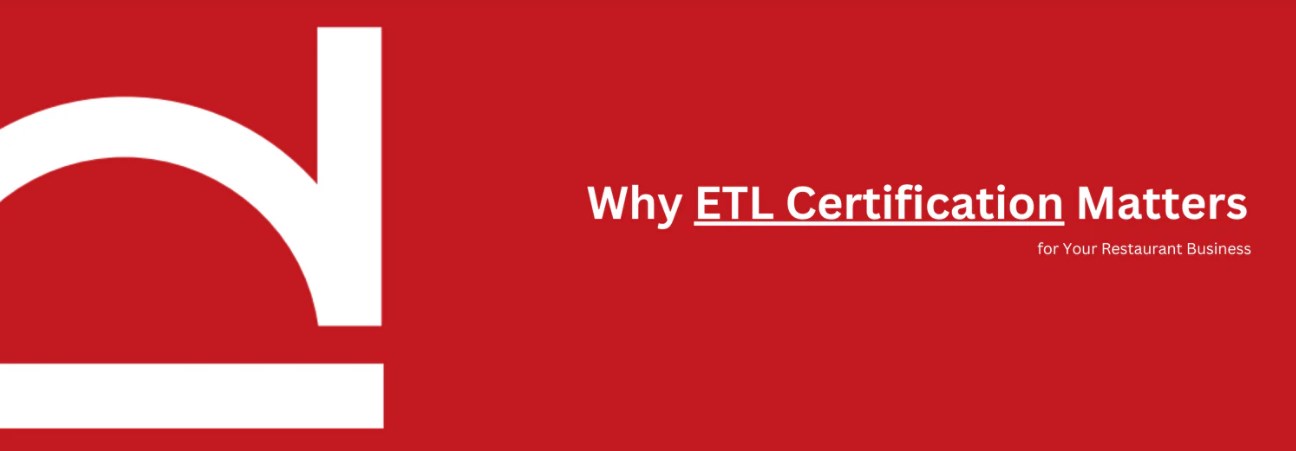
Performance Benefits
The ETL/CSA mark certifies appliances meet uniform industry standards for efficiency and operation. For example, it validates the stated power output, temperature consistency and temperature recovery times through repeated testing. Accurate BTU ratings and electricity loads are important for choosing adequately sized equipment and estimating operating costs.
ETL/CSA also verifies critical airflow, ventilation, humidity and air turnover rates for optimal cooking conditions. It ensures ovens maintain proper temperatures for baking, broilers reach searing heats evenly, and refrigerators hold set temperatures consistently. Passing these live testing parameters proves reliable, consistent performance.
Regulatory Benefits
Most jurisdictions require ETL/CSA listing for commercial kitchen equipment. In New York City, for example, all cooking appliances must meet ETL/CSA sanitation standards per the NYC health code. Having ETL/CSA certified appliances simplifies permitting and inspections for new restaurants. It also prevents violations or fines from regulators.
Additionally, many leasing companies and commissary kitchens mandate ETL/CSA equipment certification. It provides them assurance your appliances meet safety codes.
ETL/CSA certification can even lower insurance costs. Some providers offer discounts on fire/liability insurance for commercial kitchens with ETL certified appliances.

ETL Sanitation Certification
ETL Sanitation Certified appliances have undergone rigorous testing to verify hygienic design and cleanability. The certification focuses entirely on sanitation factors, including:
- Food contact zones isolated from sources of contamination
- Materials that are non-toxic, non-absorbent, and corrosion resistant
- Accessible and smooth surfaces for thorough cleaning
- Preventing ingress of bacteria, viruses, insects, or dust
- No niches where food or liquids can accumulate
- Capable of being washed, rinsed, and sanitized
By meeting the strict criteria of NSF/ANSI standards for hygiene and cleanability, ETL Sanitation Certification validates appliances are designed to minimize microbial risks and prevent cross-contamination.
ETL Certification
While ETL Sanitation covers sanitation, ETL Certification deals with the operational integrity and electrical safety of commercial appliances. Key aspects include:
- Electrical hazards like shock, electrocution, fire, and explosion
- Heating consistency for ovens, ranges, and dishwashers
- Temperature regulation for refrigerators, prep tables, and display units
- Ventilation requirements for proper airflow and humidity
- Gas safety for appliances using natural gas or propane
- Voltage fluctuations, grounding, cord connections, and wiring
- Compliance with UL safety standards and requirements
ETL Certification ensures equipment functions safely and as intended in the commercial kitchen environment after long-term use and wear.
Do Appliances Need Both?
While ETL Sanitation and ETL Certifications have distinct purposes, commercial kitchen appliances must meet both to fully comply with health codes and elec









